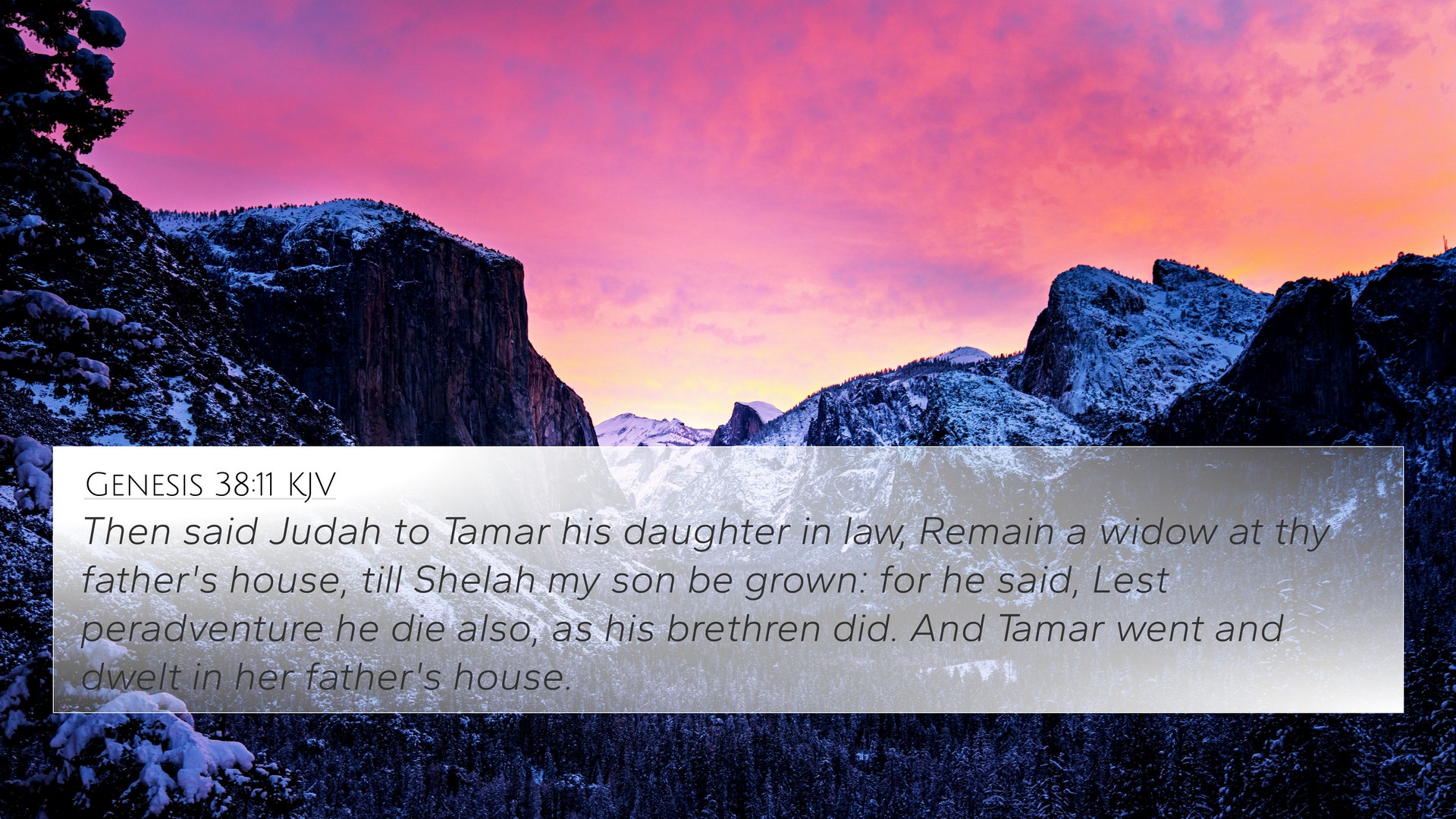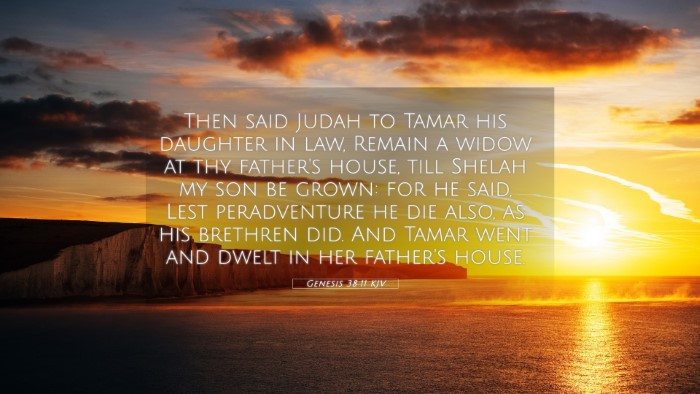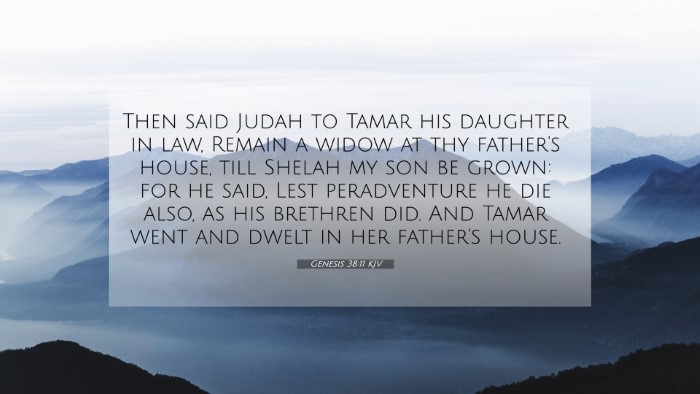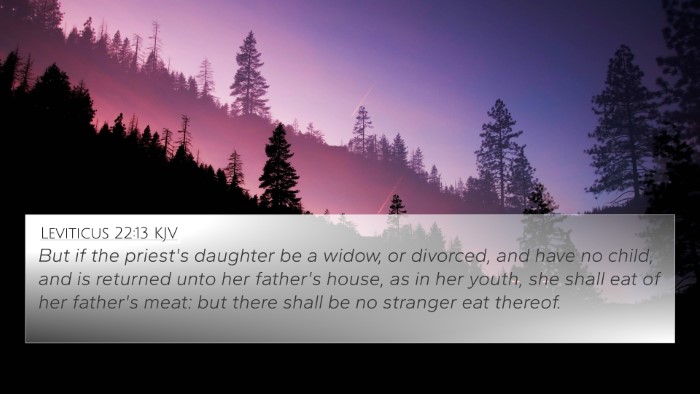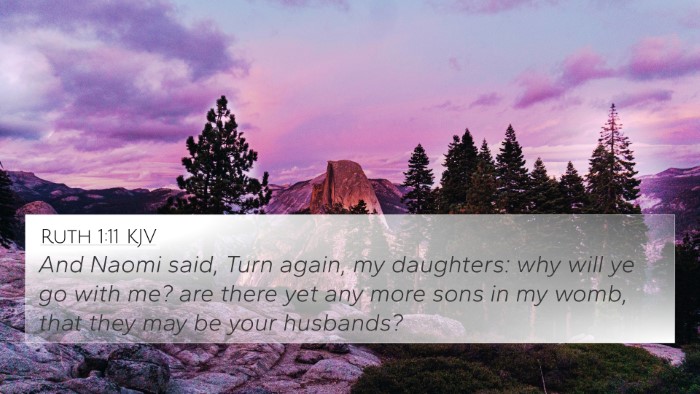Understanding Genesis 38:11
Genesis 38:11 reads: “Then Judah said to his daughter-in-law Tamar, ‘Remain a widow in your father’s house till my son Shelah is grown.’ For he said, ‘Lest he also die like his brothers.’ And Tamar went and dwelt in her father’s house.” This verse introduces a complex narrative involving themes of family responsibility, societal norms, and personal tragedy.
Verse Analysis
The significance of this verse can be explored through various lenses, highlighted by insights from prominent public domain commentaries:
- Matthew Henry's Commentary: Henry emphasizes the character of Judah and his motivations. He portrays Judah as acting out of fear for his son Shelah, reflecting on the cultural practices of levirate marriage—where a brother-in-law is expected to marry the widow of his deceased brother to preserve lineage.
- Albert Barnes' Notes: Barnes points out the sense of duty Judah felt, yet he also interprets this act as a protective measure born from superstition regarding the deaths of his other sons. The complexity of human relationships and obligations in the face of tragedy becomes apparent here.
- Adam Clarke's Commentary: Clarke explores the broader implications of Tamar’s situation, highlighting her position in society and the marginalization of women. He notes that Judah’s reluctance to marry Shelah to Tamar ties into a reflection on integrity and justice.
Thematic Exploration and Connections
This verse can be linked thematically to several other scriptures that provide a deeper understanding of its context and implications. Below are notable cross-references:
- Deuteronomy 25:5-10: This passage outlines the levirate marriage law, providing cultural context for Tamar's expectations.
- Genesis 38:6-10: Earlier verses in the same chapter detail the fates of Judah's sons, setting the stage for Tamar's complex situation.
- Matthew 1:3: The genealogy of Jesus includes Tamar, highlighting her significance despite her circumstances.
- Ruth 4:1-10: The story of Ruth features similar themes of kinsman-redeemer roles, drawing parallels to Tamar's plight.
- Titus 2:3-5: Discusses the roles and expectations of women, paralleling Tamar's situation with broader considerations of societal norms.
- Hebrews 11:31: Tamar is mentioned in the context of faith, suggesting a deeper trust in God’s plan amid her difficulties.
- 2 Samuel 13:11-14: The dynamics within Judah’s family can draw connections to later biblical narratives involving familial betrayal and justice.
Lessons and Applications
The examination of Genesis 38:11 encourages readers to consider:
- Responsibility and Fear: Judah’s fear of losing another son reflects the human tension between duty and self-preservation.
- The Role of Women: Tamar’s story opens discussions about the historical and theological roles assigned to women in Biblical narratives.
- Faith and Integrity: How does Tamar’s waiting for Shelah’s maturity reflect our own understanding of faith in God’s timing?
Conclusion
Genesis 38:11 remains a poignant verse with multifaceted meanings that encourage reflection on familial duties, gender roles, and divine providence. By cross-referencing with related scriptures, we can explore the rich interconnections within the Biblical narrative. Engaging with these texts fosters deeper understanding, providing opportunities for comparative analysis and thematic exploration.
Related Tools and Resources
For further exploration of cross-references, consider using:
- Bible concordances for finding related scriptures.
- Bible cross-reference guides to link thematically related verses.
- Comprehensive Bible study tools for in-depth scripture analysis.
